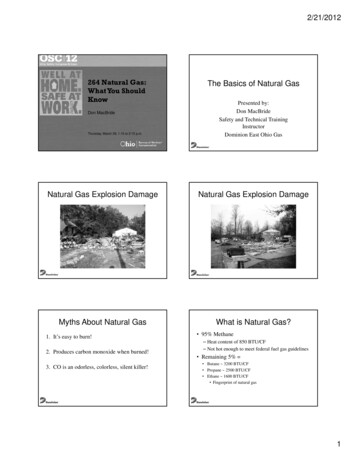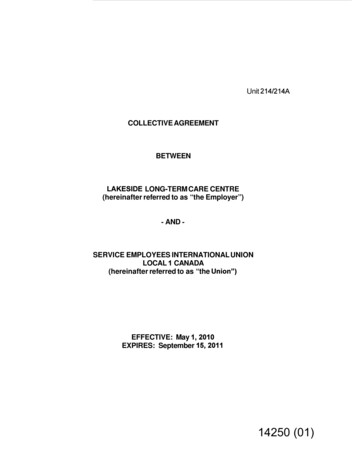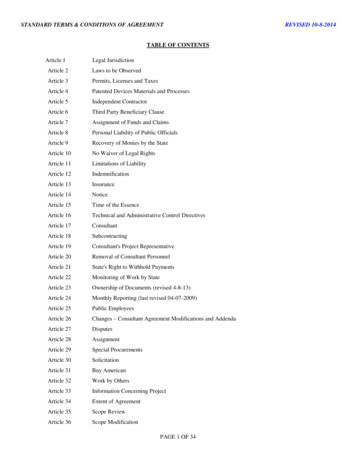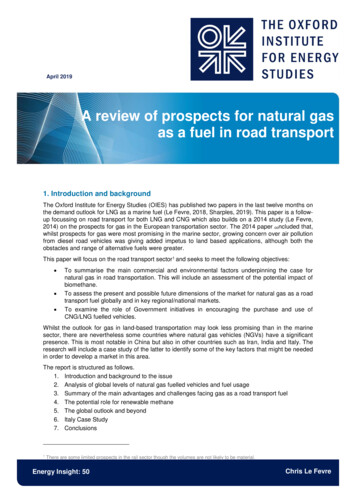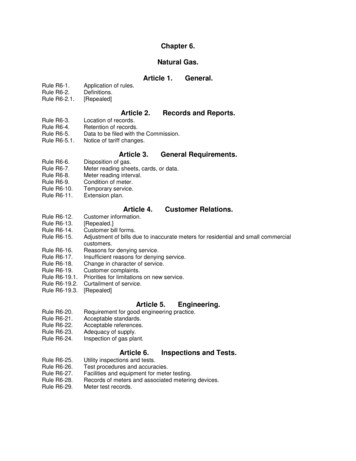
Transcription
Chapter 6.Natural Gas.Article 1.General.Rule R6-1.Rule R6-2.Rule R6-2.1.Application of rules.Definitions.[Repealed]Rule R6-3.Rule R6-4.Rule R6-5.Rule R6-5.1.Location of records.Retention of records.Data to be filed with the Commission.Notice of tariff changes.Rule R6-6.Rule R6-7.Rule R6-8.Rule R6-9.Rule R6-10.Rule R6-11.Disposition of gas.Meter reading sheets, cards, or data.Meter reading interval.Condition of meter.Temporary service.Extension plan.Rule R6-12.Rule R6-13.Rule R6-14.Rule R6-15.Rule R6-16.Rule R6-17.Rule R6-18.Rule R6-19.Rule R6-19.1.Rule R6-19.2.Rule R6-19.3.Customer information.[Repealed.]Customer bill forms.Adjustment of bills due to inaccurate meters for residential and small commercialcustomers.Reasons for denying service.Insufficient reasons for denying service.Change in character of service.Customer complaints.Priorities for limitations on new service.Curtailment of service.[Repealed]Rule R6-20.Rule R6-21.Rule R6-22.Rule R6-23.Rule R6-24.Requirement for good engineering practice.Acceptable standards.Acceptable references.Adequacy of supply.Inspection of gas plant.Rule R6-25.Rule R6-26.Rule R6-27.Rule R6-28.Rule R6-29.Utility inspections and tests.Test procedures and accuracies.Facilities and equipment for meter testing.Records of meters and associated metering devices.Meter test records.Article 2.Article 3.Article 4.Records and Reports.General Requirements.Customer Relations.Article 5.Article 6.Engineering.Inspections and Tests.
Article 7.Rule R6-30.Rule R6-31.Rule R6-32.Rule R6-33.Rule R6-34.Rule R6-35.Rule R6-36.Standards of Quality of Service.Purity requirements.[Repealed.]Pressure surveys and records.Standards for pressure measurements.Heating value.Heating value determination and records.Interruptions of service.Article 8.Safety.Rule R6-37.Acceptable standards.Rule R6-38.Protective measures.Rule R6-39.Safety program.Rule R6-40.Customer's piping.Rule R6-41.Gas leaks and annual reports.Rule R6-42 to R6-46. [Repealed.]Rule R6-47 to R6-59. [Reserved.]Article 9.Service Areas.Rule R6-60.Extension of facilities into contiguous occupied territory.Rule R6-61.Construction of pipeline facilities.Rule R6-62.Service from facilities in another gas utility's territory.Rule R6-63.Forfeiture of exclusive franchise rights.Rule R6-64 to R6-69. [Reserved.]Article 10.Accounting.Rule R6-70.Uniform system of accounts.Rule R6-71.[Repealed]Rule R6-72 to R6-79. [Reserved.]Article 11.Depreciation.Rule R6-80.Requirements for depreciation studies.Rule R6-81.Rule R6-82.Rule R6-83.Rule R6-84.Rule R6-85.Rule R6-86.Rule R6-87.Rule R6-88.Rule R6-89.General.Establishment of expansion funds.Structure and administration of expansion funds.Approval of expansion projects.Disbursements.Buy back.Reporting.Accounting and ratemaking.Deferral accounting for natural gas expansion.Article 12.Article 13.Natural Gas Expansion Funds.Additional Funding for Natural Gas Expansion.Rule R6-90.Rule R6-91.Rule R6-92.Rule R6-93.Rule R6-94.Application Process.Approval of Projects and Use of Natural Gas Bond Funds.Disbursements and Final Accounting.Reports.Accounting and Ratemaking for Regulated Recipients.Rule R6-95.Incentive Programs for Natural Gas Utilities.Article 14.Incentive Programs.
CHAPTER 6NATURAL GASARTICLE 1.GENERAL.Rule R6-1. Application of rules.These rules apply to any gas utility operating within the State of North Carolina underthe jurisdiction of the North Carolina Utilities Commission and also to interstate naturalgas companies having pipeline facilities located in North Carolina insofar as safety isconcerned.(1) These rules are intended to promote safe and adequate service to the public, toprovide standards for uniform and reasonable practices by utilities, and to establish abasis for determining the reasonableness of such demands as may be made by thepublic upon the utilities.(2) If unreasonable hardship to a utility or to a customer results from the application ofany rule herein prescribed, application may be made to the Commission for themodification of the rule or for temporary or permanent exemption from its requirements.(3) The adoption of these rules shall in no way preclude the Commission from alteringor amending them, or from making such modifications with respect to their applicationas may be found necessary to meet exceptional conditions.(4) These regulations shall in no way relieve any utility from any of its duties under thelaws of this State.(NCUC Docket No. G 100, Sub 9, 7/26/67.)
Rule R6-2. Definitions.(a) "Utility" means any gas company operating under the jurisdiction of the Commission,including in the case of safety rules and regulations, any interstate pipeline companysubject to the safety jurisdiction of the Commission pursuant to G.S. 62 50.(b) "Customer" means any person, firm, association, or corporation, or any agency ofthe federal, State, or local government, being supplied with gas service by a gas utility.(c) "Premises" means a piece of land or real estate, including buildings and otherappurtenances thereon.(d) "Gas plant" means all facilities owned by a gas utility for the production, storage,transmission, and distribution of gas.(e) "Main" means a gas pipe, owned, operated, or maintained by a utility, which is usedfor the purpose of transmission or distribution of gas, but does not include "gas serviceline."(f) "Gas service line" is the pipe that runs between a main or a pipeline and a customer'smeter.(g) "Meter," without other qualification, shall mean any device, or instrument which isused by a utility in measuring a quantity of gas.(h) "Check flow" means a flow at approximately 20% of the rated capacity of a meter ata pressure of 11/2/" water column on prover.(i) "Full rated flow" means a flow of 100% of the rated capacity of meter at a pressure of11/2/" water column on prover.(j) "Open rated flow" means a flow with meter outlet unrestricted at a pressure of 11/2/"water column on prover.(k) "Cubic foot" of gas as used in these rules shall have the following meanings:(1)Where gas is supplied and metered to customers at the pressure normallyused for domestic customers' appliances, a cubic foot of gas shall be thatquantity of gas which, at the temperature and pressure existing in themeter, occupies one cubic foot.(2)When gas is supplied to customers at other than the pressure in (1)above, a cubic foot of gas shall be that quantity of gas which, at atemperature of 60 F. and a base pressure of 14.73 pounds per squareinch absolute, occupies one cubic foot, atmospheric pressure assumed tobe 14.73.(3)The standard cubic foot of gas for testing the gas itself for heating valueshall be that quantity of gas, saturated with water vapor, which at atemperature of 60 F. and a pressure of 30 inches of mercury, occupiesone cubic foot. (Temperature of mercury 32 F. acceleration due togravity 32.17 feet per second; density 13.595 grams per cubiccentimeter).(l) "Interruption of service" means any disturbance of the gas supply whereby the pilotflame on the appliances of at least 50 customers shall have been extinguished.(m) The abbreviations used, and their meanings, shall be as follows:(1)BTU — British Thermal Unit.(2)LP Gas — Liquified Petroleum Gas.(3)psig — Pounds Per Square Inch, Gauge.(4)W.C. — Water Column.1
(NCUC Docket No. G 100, Sub 9, 7/26/67; NCUC Docket No. G-100, Sub 90, 4/29/11.)2
Rule R6-2.1. Repealed by NCUC Docket No. G-100, Sub 79, 12/02/99
ARTICLE 2.RECORDS AND REPORTS.Rule R6-3. Location of records.All records required by these rules, or necessary for the administration thereof, shall bekept within this State, unless otherwise authorized by the Commission. These recordsshall be available for examination by the Commission, the Public Staff, or theirauthorized representatives at all reasonable hours.(NCUC Docket No. M-100, Sub 75, 10/27/77.)
Rule R6-4. Retention of records.Unless otherwise specified by the Commission, all records required by these rules shallbe preserved for the period of time specified in the current edition of the NationalAssociation of Regulatory Utility Commissioners' publication "Regulations to Govern thePreservation of Records of Gas, Electric and Water Utilities."(NCUC Docket No. G-100, Sub 74, 12/4/97.)
Rule R6-5. Data to be filed with the Commission.The utility shall file with the Commission the following documents and information, andshall maintain such documents and information in a current status:(1) A copy of the utility's tariff, including the utility's rules, or terms and conditionsdescribing the utility's policies and practices in rendering service. These rules shallinclude:a.The standard total heating value of the gas in BTU's per cubic foot. Ifnecessary, this may be listed by district, division, or community.b.The list of the items which the utility furnishes, owns, and maintains on thecustomer's premises, such as gas services, meters, regulators, vents, andshut-off valves.c.General statement indicating the extent to which the utility will provide freeservice in the adjustment of customer's appliances.d.General statement of the utility's policy in making adjustments for wastageof gas when such wastage occurs without the knowledge of the customer.e.A statement indicating the minimum number of days allowed for paymentof the gross amount of the customer's bill before service will bediscontinued for nonpayment.(2) A copy of each special contract for service.(3) A copy of each type of customer bill form.(4) A map showing the utility's operating area. This map shall be revised annuallyunless such revision is unnecessary, in which event the utility shall notify theCommission that the map on file is current. The map should show:a. Gas production plant.b. Principal storage holders.c. Principal transmission and distribution mains by size.d. System metering (supply) points.e. State boundary crossings.f. Franchise area.g. Names of all communities (post offices) served.(5) The name, title, address, and telephone number of the person who should becontacted in connection with:a.General management duties.b.Customer relations (complaints).c.Engineering operations.d.Meter tests and repairs.e.Emergencies during nonoffice hours.(6) A copy of the utility's construction and operational budget filed annually by saidutility.(7) Monthly reports of gas service.a.Each utility shall file a "Gas Service" monthly report, on forms provided bythe Commission, showing:1.The daily and the monthly average heating value of the gas.2.Interruptions of service occurring during the month.3.Meter report G 1 (revised).
b.These reports shall be due in the Commission's offices within thirty (30)days after the end of the month reported.(8) The responsibility for the maintenance of necessary records to establish thatcompliance with these rules has been accomplished rests with the utility. Such recordsshall be available for inspection at all times by the Commission or the Commission Staffor the Public Staff.(9) Two copies of annual report on forms furnished by the Commission.(10) a.At least 30 days prior to the construction or major reconstruction of anygas pipeline or main intended to be subjected to pressures in excess of100 psig, a report shall be filed with the North Carolina UtilitiesCommission setting forth the specifications for such pipeline or main.b.The Commission shall be advised with at least 24 hours' notice prior to thetesting of any gas pipeline or main intended to be subjected to pressuresin excess of 100 psig.c.Within 60 days after the construction of any gas pipeline or main intendedto be subjected to pressures in excess of 100 psig is placed in operation,a report shall be filed with the North Carolina Utilities Commissioncertifying the maximum pressure to which the line is intended to besubjected and also certifying that the pipeline has been constructed andtested in accordance with the requirements of the rules herein prescribed,which report shall include the results of all tests made pursuant thereto.No gas pipeline shall be operated at pressures in excess of the pressurefor which it was certified to the North Carolina Utilities Commission.(11) Each franchised natural gas local distribution company (LDC) shall file reports withthe Commission detailing its plans for providing natural gas service in unserved areas ofits franchised territory. Such reports shall be updated at least every two years on orbefore October 31 of odd numbered years and, at a minimum, shall include thefollowing:(a)A map or maps that show the LDC's existing franchise area and areaswhere gas is currently available, including municipalities andunincorporated areas, and the locations of transmission and high pressuredistribution mains outside of corporate limits.(b)If the LDC had a project to serve an unserved area in progress at the timethe immediately preceding report was filed, a description of each suchproject, including, as appropriate, its current status and its estimated dateof completion.(c)A summary of all requests or inquiries about service from potential largecommercial and industrial customers considering locations noteconomically feasible to serve under the LDC's approved plan for theextension of mains and service lines.(d)If the LDC has no unserved areas, the report should so state and nofurther information, beyond that required above, is required to be included.(e)If the LDC has one or more unserved areas within its franchise territory,the following additional information must be included:(i)A description of project(s) that would extend natural gas to suchunserved areas, including maps showing the proposed routes for
natural gas pipelines and the proposed timetable for completion ofthe project(s). Said maps should show the areas in which the LDCplans to offer natural gas service within the next three years,including the location of proposed facilities, relative to currentlyserved areas.(ii)An explanation of the reason(s) it is not proposing to extend naturalgas service to each unserved area.(iii)Construction budgets for each planned project.(iv)An estimate of the number of customers to be served from eachplanned project, broken down as to customer class with projectedannual revenues from each class and total revenues from allprojects for each of the next three years subsequent to completion.(v)A present value analysis for each planned project.(vi)A financing plan detailing the key terms for possible sources offunds to finance each planned project, including natural gasexpansion funds, natural gas bonds, contributions in aid ofconstruction, various types of public financing, or issuances of debt,equity, and other types of external financings.(vii) All workpapers supporting the determinations, analysis, orconclusions contained in the study or studies shall be provided tothe Commission and the Public Staff. If additional information isrequired, each LDC will provide such information promptly uponrequest to the Commission and the Public Staff.(NCUC Docket No. G-100, Sub 7, 5/31/67; NCUC Docket No. G-100, Sub 34, 10/5/77;NCUC Docket No. M-100, Sub 75, 10/27/77; NCUC Docket No. G-100, Sub 53,10/25/89; 8/18/94; NCUC Docket No. G-100, Sub 74, 12/4/97; G-100, Sub 86,09/04/03.)
Rule R6-5.1.NOTICE OF TARIFF CHANGES.Each tariff filing involving any change in any existing tariff, whether made in the contextof a general rate case or any other type of proceeding, shall include a copy of theexisting tariff showing by cross outs and italicized inserts all proposed changes in rates,charges, terms and conditions, service rules and regulations, and other text.(NCUC Docket No. G-100, Sub 46, 1/21/87.)
Article 3.General Requirements.Rule R6-6. Disposition of gas.(a) All gas sold by a utility shall be on the basis of meter measurement unless otherwiseauthorized by the Commission.(b) Wherever practicable, consumption of gas within the utility itself, or by administrativeunits associated with it, shall be metered.
Rule R6-7. Meter reading sheets, cards or data.The meter reading sheets, cards or data shall show:(1)Customer's name, address, and rate schedule.(2)Identifying number and/or description of the meter(s).(3)Meter readings.(4)If the reading has been estimated.(5)Multiplier or constants should be shown if applicable.(NCUC Docket No. G-100, Sub 74, 12/4/97.)
Rule R6-8. Meter reading interval.Meters shall be read monthly, except that authority may be obtained from theCommission for reading the meters at other than monthly intervals. As nearly aspracticable, utilities shall avoid sending a customer two successive estimated bills.
Rule R6-9. Condition of meter.No meter shall be installed which is mechanically defective, has an incorrect correctionfactor or has not been tested and adjusted in accordance with Rule R6 26. The capacityof the meter and the index mechanism should be consistent with the gas requirementsof the customer.
Rule R6-10. Temporary service.When the utility renders temporary service to a customer, it may require that thecustomer bear all the cost of installing and removing the service in excess of anysalvage realized.
Rule R6-11. Extension plan.Each utility shall develop a plan, acceptable to the Commission, for the installation ofextensions of main and service lines where such facilities are in excess of thoseincluded in the regular rates for service and for which the customer shall be required topay all or part of the cost. This plan must be related to the investment that prudently canbe made for the probable revenue.
Article 4.Customer Relations.Rule R6-12. Customer information.Each utility shall:(1) Maintain up to date maps, plans, or records of its entire transmission and distributionsystems, with such other information as may be necessary to enable the utility to adviseprospective customers, and others entitled to the information, as to the facilitiesavailable for serving any locality.(2) Assist the customer or prospective customer in selecting the most economical rateschedule.(3) Notify customers, as required by the Commission, affected by a change in rates orschedule classification.(4) Post a notice in a conspicuous place in each office of the utility where applicationsfor service are received, informing the public that copies of the rate schedules and rulesrelating to the service of the utility, as filed with the Commission, are available forinspection.(5) Upon request, inform its customers as to the method of reading meters.(6) Furnish such additional information as the customer may reasonably request.(7) During July and August of each year, consumption for each customer for the twelvemonths ending June 30 of such year and the prior year shall be reviewed. If it is foundthat the customer has either increased or decreased his annual consumption based onthe two prior years' consumption to the point it would place him on a different rateschedule, the customer shall be automatically reclassified to the proper rate scheduleeffective the following September 1. In determining consumption, periods of involuntarycurtailment shall be excluded.Each customer reclassified under this rule shall be notified of the change in rateschedule, along with a copy of the tariff sheets applicable to his old and new rateschedules, at least twenty-one days prior to the effective date of the change.(NCUC Docket No. G-100, Sub 48, 2/22/91.)
Rule R6-13. Repealed by NCUC Docket No. M-100, Sub 28, 5/6/70, effective July 1,1970.
Rule R6-14. Customer bill forms.The utility shall bill each customer as promptly as possible following the reading of hismeter. The bill shall show:(1) The reading of the meter at the beginning and at the end of the period for which thebill is rendered.(2) The date on which the meter was read at the end of the billing period.(3) The number of units metered.(4) Identification of the applicable rate schedule.(5) The gross and/or net amount of the bill.(6) The date by which the customer must pay the bill in order to benefit from anydiscount or to avoid any penalty.(7) A distinct marking to identify an estimated bill.(8) Any conversion from meter reading units to billing units, or any calculations todetermine billing units from recording or other devices, or any other factors, such aspurchased gas or fuel adjustments, used in determining the bill. In lieu of suchinformation on the bill, a statement must be on the bill advising that such informationcan be obtained by contacting the utility's principal office.
Rule R6-15. Adjustment of bills due to inaccurate meters for residential and smallcommercial customers.Bills which are incorrect due to meter errors where the meters in question have notbeen tampered with by the customer are to be adjusted as follows:(1) Meter Accuracy. — Whenever a meter in service is tested and found to be accuratewithin 2%, there shall be no adjustment to the customer's bill.(2) Billing Adjustments. — Billing adjustments due to fast or slow meters shall becalculated on the basis that the meter should be 100% accurate. The actual accuracyshall be the accuracy determined by averaging the results at the check and open ratedflow.(a) Fast Meters. — Whenever a meter in service is tested and found to haveoverregistered more than 2%, the utility shall adjust the customer's bill forthe excess amount paid as determined below, except that the utility neednot adjust the customer's bill if the excess amount paid is less than 5.00.(i)If the time at which the error first developed or occurred canreasonably be determined, the estimated amount of overcharge isto be based on the actual period of the overcharge but not toexceed a maximum of three (3) years from the discovery of theerror.(ii)If the time at which the error first developed or occurred cannotreasonably be determined, the estimated amount of overcharge isto be based on the most recent twelve (12) month period from thediscovery of the overcharge.(iii)No part of the minimum bill or facilities charge shall be refunded.(iv)The utility shall not be required to make refunds to more than thelast two customers who purchased gas through a fast meter asdefined in the rule.(b)Slow Meters. — Whenever a meter in service is tested and found to haveunderregistered more than 2%, the utility shall adjust the customer's bill forthe deficient amount due as determined below except that the utility neednot adjust the customer's bill if the deficient amount due is less than 5.00.(i)Regardless of whether the time at which the error first developedcan or cannot reasonably be determined, the estimated amount ofundercharge may not exceed one (1) year.(ii)When billing for the underregistered usage and the underchargeexceeds 25.00, the utility shall allow the customer the option ofpaying the undercharge in equal payments, without any penalty orinterest charges, for a period of time equal to the period duringwhich the meter underregistered, up to a maximum of one (1) year.(c)Nonregistering Meters. — Whenever a meter is found to be stopped, theutility may estimate and bill the customer the proper charge for theunregistered service by reference to the customer's consumption duringsimilar normal periods or by such method as the Commission mayauthorize or direct.(i)The utility may backbill the customer from the point in time themeter stopped, up to a maximum of twelve (12) months.
(ii)When billing for the nonregistered usage, the utility shall allow thecustomer the option of paying the undercharge in equal payments,without any penalty or interest charges, for a period not to exceedthe customer's next six (6) billing periods.(NCUC Docket No. G-100, Sub 71, 8/1/96.)
Rule R6-16. Reasons for denying service.Service may be refused or discontinued for any of the reasons listed below. Unlessotherwise stated, the customer shall be allowed a reasonable time in which to complywith the rule before service is discontinued.(1) Without notice in the event of a condition determined by the utility to be hazardous.(2) Without notice in the event of customer use of equipment in such a manner as toadversely affect the utility's equipment or the utility's service to others.(3) Without notice in the event of tampering with the equipment furnished and owned bythe utility.(4) Without notice in the event of unauthorized use.(5) For violation of and/or noncompliance with these rules and regulations.(6) For failure of the customer to fulfill his contractual obligations for service and/orfacilities subject to regulation by the Commission.(7) For failure of the customer to permit the utility reasonable access to its equipment.(8) Repealed by NCUC Docket No. M-100, Sub 28, 5/6/70, effective July 1, 1970.(9) Repealed by NCUC Docket No. M-100, Sub 28, 5/6/70, effective July 1, 1970.(10) For failure of the customer to furnish such service equipment, permits, certificates,and/or rights of way, as shall have been specified by the utility as a condition toobtaining service, or in the event such equipment or permissions are withdrawn orterminated.(NCUC Docket No. M-100, Sub 28, 5/16/70.)
Rule R6-17. Insufficient reasons for denying service.The following shall not constitute sufficient cause for refusal of service to a present orprospective customer:(1) Delinquency in payment for service by a previous occupant of the premises to beserved.(2) Failure to pay for merchandise purchased from utility.(3) Failure to pay for a different type or class of public utility service.(4) Failure to pay the bill of another customer as guarantor thereof.
Rule R6-18. Change in character of service.The following procedure shall be followed whenever there is a material change in thecharacter of the gas service:(1) Changes under the Control of the Utility. — The utility shall make such changes onlywith the approval of the Commission, and after adequate notice to the customers.(2) Changes Not under the Control of the Utility. — The utility shall maintain the propercombustibility of the gas supplied at the heating valve and specific gravity existing at thecustomers' meters (See Rule R6-34(b)).
Rule R6-19. Customer complaints.(a) Complaints concerning the charges, practices, facilities or service of the utility shallbe investigated promptly and thoroughly. The utility shall keep such records of customercomplaints as will enable it to review and analyze its procedures and actions.(b) A report of incorrectly adjusted appliances shall be given prompt attention.
Rule R6-19.1. Priorities for limitations on new service.(a) Any natural gas company in North Carolina placing any limitations on sales of gas tonew customers shall file within thirty (30) days with this Commission a program for salesto new customers and additional sales to existing customers as may be requiredbecause of insufficient gas supply, which program shall provide the following order ofpriorities for such service:(1)Gas service to all residential customers requesting service who can befeasibly served, including multiple housing.(2)Gas service to small commercial and small industrial users whoserequirements do not exceed 20 Mcf per day.(3)Industrial customers utilizing natural gas as a raw material or in directapplication of gas flame where no other heat is usable.(4)Large commercial customers whose requirements exceed 20 Mcf per day.(5)Large industrial customers whose requirements exceed 20 Mcf per day.(6)Preferred interruptible customers.(7)Interruptible customers.(8)Dump schedule customers.(b) Said natural gas utilities shall file such restrictive sales program with thisCommission in accordance with subsection (a) of this rule in tariff form, includinglimitations of the size of interruptible customers, if any, within 30 days after the date ofthis rule.(c) All natural gas utility companies in North Carolina without sufficient gas supply forpeak day demand shall install as needed sufficient peak shaving equipment to meet theneeds of residential customers.(NCUC Docket No. G-100, Sub 12, 7/27/71, 7/29/71; NCUC Docket No. G-100, Sub 79,12/02/99.)
Rule R6-19.2. Curtailment of service.(a) In the event that a North Carolina retail gas utility cannot supply the demands of allits customers, the utility shall curtail the customers paying the least margin perdekatherm first. This applies to all customers, be they transportation customers, regularsales rate customers, municipal customers or otherwise. However, if operatingconditions require some interruption of service to a particular geographical area insteadof a utility's entire system, then curtailment by margin should be applied only to thosecustomers within the affected areas.(b) If it is necessary to interrupt some but not all customers paying the same margin perdekatherm, then, to the extent practicable, service shall be curtailed to the customerspaying the same margin per dekatherm on a pro rata basis for the season.(c) For the convenience of wording in tariffs, the following definitions of priorities by enduse will be retained. However, these priorities are not to be used for purposes ofcurtailment priorities unless the Commission so orders pursuant to section (d) below.(i)Priority 1. Residential. Essential Human Needs With No Alternate FuelCapability. Commercial less than 50 Mcf/day.1.1Residential requirements and essential human needs with noalternate fuel capability.1.2 Commercial less than 50 Mcf/day.Priority 2. Industrial Less Than 50 Mcf/day. Process, Feedstock and PlantProtection With No Alternate Fuel Capability. Large commercialrequirements of 50 Mcf or more per day except for large commercial boilerfuel requirements above 300 Mcf/day.2.1Industrial less than 50 Mcf/day.2.2Commercial between 50 and 100 Mcf/day.2.3Commercial greater than 100 Mcf/day, non boiler use.2.4Commercial greater than 100 Mcf/day, with no alternate fuelcapability.2.5Industrial process, feedstock and plant protection between 50 and300 Mcf/day, with no alternate fuel capability.2.6Industrial process, feedst
Customer bill forms. Rule R6-15. Adjustment of bills due to inaccurate meters for residential and small commercial customers. Rule R6-16. Reasons for denying service. Rule R6-17. Insufficient reasons for denying service. Rule R6-18. Change in character of service. Rule R6-19. Customer complaints. Rule R6-19.1. Priorities for limitations on new .

